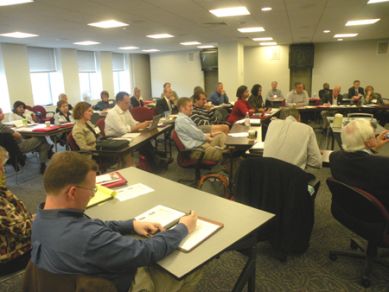NCC Looks at Media Power and Justice During Annual Meeting

The power of media and accomplishing justice in the field were the topics of discussion at last week's Fall annual meeting of the National Council of Churches (NCC) Communications Commission, which met in New York City from Sept. 28 to 30.
Speaking at the opening session of the meeting on Monday, Serene Jones, president of the Union Theological Seminary in New York City said that the Internet, social networking, virtual reality, and other forms of modern media are creation "new kinds of selves" and "new communities," in society.
Jones likened the significance of modern media such as, to that of the 15th century printing press, which made the first mass-produced Bibles that people could read at home.
"The space between reader and (biblical) text began to collapse," Jones said of the historical event. "There was a new focus on our conscience and our interaction with the Bible. A new set of thought wires began to develop."
"We're living in a similar moment with respect to the changes that are taking place," she continued. "New kinds of selves are being created -- new synapses are emerging in our brains. New communities are being formed ... The Internet is quickly replacing the communities we used to call churches."
Jones also suggested that the transition into new media could be disorienting for many, likening the experience to that of the Apostle Peter's when he was miraculously released from prison in Acts chapter 12.
"Two angels came and told Peter to put on his clothes, the chains fall, the doors open and he finds himself on the street," she said. "He thought it was a dream -- but it was a dawning reality."
"That's what transition does. It throws us into disorientation. What we have to do is trust that the God we believe in surrounds us with angels who will guide us -- and as we awake on the other side, life will be good beyond imagining. What a perfect faith that is."
Also addressing the communications commission was People's Production House Executive Director Deepa Fernandes of People's Production House, who placed an emphasis on media justice.
"We will never truly have democracy if poor communities do not own the means of (media) production," she said. "We come from communities that are not represented well in the media. How do we keep our stories front and center?"
In early 2009, the NCC helped form "So We Might See," an ecumenical, interfaith coalition purposed in education and advocacy for media justice.
"Faith communities and media reform are at the heart of each and every social change movement," reads a statement from the group, which includes members of communications departments from the United Church of Christ, the U.S. Catholic Conference of Bishops, and the Islamic Society of North America among others. "By working across religious lines, So We Might See brings a unified, prophetic witness to weigh in on the ethical and justice issues being raised by rapid changes in telecommunications."
In between meeting sessions, members of the Communications Commission went to visit prominent media figures in the New York City area, including Jack Blessington, chief of the religion and culture unit of CBS; Dr. William F. Baker, president emeritus of Educational Broadcasting Corporation; David Brancaccio, senior editor of NOW on PBS; Laurie Goodstein, New York Times' National Religion Correspondent; and Rachel Zoll, national religion correspondent for the Associated Press.
After the meeting, several commission members headed to New York's Riverside Church to hear the 27th Annual Everett C. Parker Ethics in Telecommunications Lecture delivered by Dr. Michael Kinnamon, general secretary of the NCC.
"Both the ecumenical church and the serious public media seek to promote a healthy community marked by free, vital communication," the general secretary said during his lecture. "Such community, however, seems increasingly remote in our era -- and I think we have common cause in trying to identify and address those things which undermine it."
Kinnamon said that technological advances in communication have been a source of hindrance in building community.
"New forms of telecommunications offer an immediacy that transcends time and distance, but they also increase dramatically the gulf between those with access to such technology and those still deprived of even the basic essentials of life," the NCC leader stated. "Communications technology is not only reshaping our world, it is also contributing to the increasing disparity within it."
While not presenting a clear answer to the problems facing community building, Kinnamon said that agreement on criteria for communication is key.
"Community can certainly be made up of those who disagree. In fact, if you assume (as I and most ecumenists do) that unity is a gift, then it cannot be synonymous with human agreement. But can community be fostered if those in it don't even agree on the criteria for communicating?" he said.
The Everett C. Parker lecture is an annual event named after the founder and former head of the United Church of Christ Office of Communication, who was also in attendance for this year's lecture.